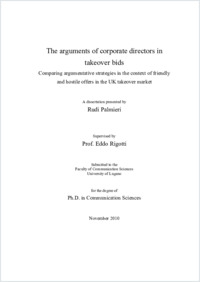The arguments of corporate directors in takeover bids : Comparing argumentative strategies in the context of friendly and hostile offers in the UK takeover market
- Palmieri, Rudi
- Rigotti, Eddo (Degree supervisor)
-
03.12.2010
225 p.
Thèse de doctorat: Università della Svizzera italiana, 2010 (jury note: Magna cum laude)
Acquisitions
argumentation
argument schemes
argumentum model of topics
board of directors
city code
communication context
critical discussion
disclosure
discourse analysis
endoxa
financial communication
friendly offers
hostile offers
inference
information
interaction field
maxims
managerial reasoning
mergers
practical reasoning
rhetoric
shareholders
stock market
strategic maneuvring
takeover bids
takeover defence
UK takeover panel
English
This dissertation analyzes argumentative interactions in the context of corporate takeover bids, representing thus a first systematic study of financial communication from the perspective of argumentation theory. In general, the importance of financial communication is justified by the relevance of information for making sound investment decisions (cf. Healy & Palepu 2001; Williams 2008). But, information is a crucial factor insofar as it is an essential component of the argumentative processes on which decisions are built: the soundness of arguments significantly depends on reliable and shared material starting points (van Eemeren & Grootendorst 1992; Rigotti & Greco Morasso 2009, 2010). Now, several scholars have shown that companies do not simply disclose information as they select, elaborate and even manipulate them in order to induce certain investment decisions (Degeorge et al. 1999; Dechow & Skinner 2000; Merkl-Davies & Brennan 2007). There is, however, scarce awareness of the argumentative dimension hat characterizes numerous activities of financial communication (chapter 2). Through an argumentative discourse, information is inferentially “put at work” in order to justify an opinion, or, as often is the case in finance, in order to persuade an audience of the expediency of a proposed transaction. The quality of the crucial decisions entailed by takeover bids, in which one company (the bidder) proposes to the shareholders of another company (the target) to tender their shares, largely depends on the information that corporate directors make available (cf. Sudarsanam 1995; Brennan et al. 2010). A relevant question becomes, thus, understanding whether and how corporate directors attempt to influence shareholders’ decision by means of argumentation, inviting them to accomplish a certain inference on the basis of the provided information. In order to answer this general question and other more specific questions (cf. chapter 1), the dissertation has considered takeover bids made to firms listed in the UK market, which is regulated by the City Code on Takeovers and Mergers. The takeover bid has been conceived of in terms of activity type (Levinson 1992; Rigotti & Rocci 2006, van Eemeren 2010), undertaken by the bidder in order to obtain the desired modification of the concerned social reality (chapter 3). This reconstruction identifies the communicative interactions aimed to realize these activities, the main interagents involved, the institutional commitments imposed to them, and the contextual constrains on their strategic maneuvering (van Eemeren 2010). The target directors play here a decisive role because they may recommend shareholders accept or reject the offer (cf. Morck et al. 1988), giving rise to different argumentative situations. Interestingly, the Code not only requires B-and T-directors to disclose relevant information, but also imposes to both of them specific commitments of justification. In particular, B-directors must give the commercial justification behind the offer, while the T-board has to state the reasons for its recommendation. The analysis of different documents pertaining to 20 cases of takeover bids (launched in the 2006-2010 period) has brought to light how directors, through various strategies, fulfill their informative and argumentative obligations and simultaneously try to persuade shareholders. Crucial differences have emerged by comparing cases in which the offer was recommended by the T-board (friendly bids) and cases in which the bid was opposed (hostile bids). In friendly bids (discussed in chapter 4), the agreement previously sealed by the two boards brings about a coordinated communication. The bidder justifies the intended corporate acquisition without advancing its opinion about the offer. T-directors argumentatively support the offer’s acceptance indirectly, by outlining the reasons having motivated their decision. The arguments chosen from the topical potential pertain both to the strictly financial aspects and to the consequences that the implied acquisition will have on the target company. The often ambiguous presentation of these two types of arguments makes it difficult to understand whether the latter concern also shareholders or only the other stakeholders. In hostile bids (exposed in chapter 5), both sides develop their own argumentative discourse and partially attack the other’s arguments. The arising argumentative battle mainly centers on the financial aspects of the proposed deal. The strategic maneuvering of directors affects all stages of critical discussion, but is particularly important at the level of opening stage. Here, typically, the argumentative dispute comes to affect the endoxical background assumptions relating to which information become relevant for decision (e.g. criteria for valuation, assumptions justifying profit forecasts and other predictions, etc.). Numerous implication emerges which are relevant to understand the relation between information and argumentation. These outcomes suggest that argumentation relevantly affects the process through which the eventual decision is made. Further research is needed to verify more in depth this aspect. In particular, the results of this dissertation may be further exploited in interdisciplinary studies aiming to assess financial decisions also in its argumentative dimension.
- Language
-
- English
- Classification
- Information, communication and media sciences
- License
-
License undefined
- Identifiers
-
- RERO DOC 23234
- URN urn:nbn:ch:rero-006-110076
- ARK ark:/12658/srd1318362
- Persistent URL
- https://n2t.net/ark:/12658/srd1318362
Other files
Statistics
Document views: 451
File downloads:
- Texte intégral: 1547
- Annexes 1-4: 0
- Annexe: 0
- Annexe: 0
- Annexe: 0
- Annexe: 0
- Annexe: 0
- Annexe: 0
- Annexe: 0
- Annexe: 0
- Annexe: 0
- Annexe: 0
- Annexe: 0
- Annexe: 0
- Annexe: 0
- Annexe: 0
- Annexe: 0
- Annexe: 0
- Annexe: 0
- Annexe: 0
- Annexe: 0

